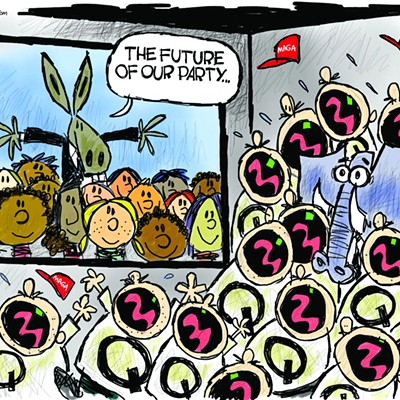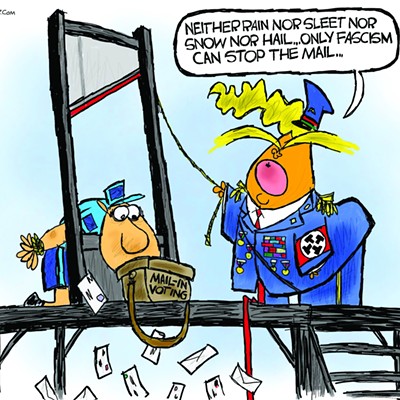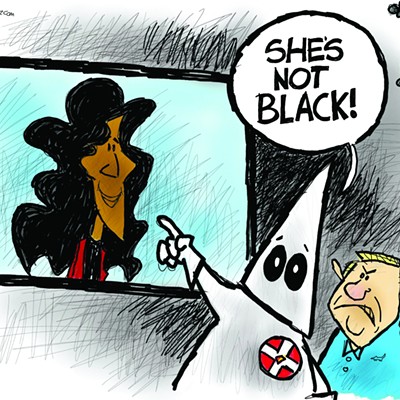In 1985, Tucson voters passed an initiative that instituted public financing for city elections. The proposal was spearheaded by then-Councilman Tom Volgy, who feared that the costs of running a political campaign would continue to rise unless some incentive kept them lower. So Volgy proposed a voluntary system that matched every dollar that candidates raised as long as they agreed to spending limits.
Under the program, City Council candidates qualify for matching funds if they manage to collect at least 200 contributions of at least $10 from city residents. (Mayoral candidates must collect an additional hundred contributions.)
Although final spending limits (based on a formula related to the number of registered voters, adjusted for inflation) will be determined later this month, mayoral candidates will be limited to spending roughly $164,500, while council candidates face a ceiling of about $82,250.
The program has been effective at limiting campaign spending, which means that candidates can't afford to simply blanket airwaves with 30-second campaign spots. Instead, they traditionally campaign door-to-door, appear at forums and use low-cost mailers and media to reach voters.
Candidates have embraced the program. All of the current members of the City Council have used it for their campaigns and all the candidates running this year have signed contracts agreeing to the limits.
Volgy, who served as mayor from 1987 to 1991, has returned to local politics to challenge Republican Mayor Bob Walkup in the Nov. 4 general election.
In reports filed last week with the city covering fund-raising activity through May 31, Walkup had the fund-raising advantage. He had raised $78,471 and spent $17,301, leaving him with $61,170.
By comparison, Volgy had raised only $46,693 and spent $20,634, leaving a balance of $26,059.
In the westside Ward 1 council race, Republican challenger Armando Rios Jr. had opened up a 10-1 fund-raising advantage over Councilman José Ibarra. Rios, who is making his first run for public office, had raised $44,030 and applied for matching funds. Provided he qualifies, he won't need to raise any more money this year. Rios reported spending only $2,384.
Ibarra, a political veteran, had raised only $4,740 from 32 contributors, leaving him a long way from qualifying for matching funds. Ibarra had spent $1,581, including a $28 fee for a bounced check.
Ibarra says he doesn't plan to raise much money for the campaign.
A glance at another council race shows that the GOP is banking heavily on Rios. In Ward 4, Republican Mike Jenkins, who hopes to unseat Democrat Shirley Scott in southeast Ward 4, reported raising just $1,182, mostly in $10 increments.
Scott reported raising $26,661 and spending $5,015, leaving her with $21,646.
In Ward 2, where Councilwoman Carol West faces political newcomer Lianda Ludwig in the Sept. 9 Democratic primary, both candidates have already filed for matching funds. The spending limit for primaries this year is roughly $61,694.
Ludwig reported that she had raised $8,034 and spent $6,739, leaving her with a balance of $1,295.
West, meanwhile, had raised $37,696 and received an additional $6,399 in public funds, bringing her total to $46,105. She had spent $7,401.
In recent years, independent campaign committees, backed by business interests and the Republican Party, have upset the relative balance of campaign spending. In 1999, an independent committee spent more than $50,000 boosting Republican Bob Walkup's successful mayoral campaign. Two years ago, a pair of independent campaigns spent a combined $124,000 to boost Republicans Fred Ronstadt and Kathleen Dunbar.
A good chunk of the independent money in 2001 went to a sophisticated early-voting campaign that clobbered the Democratic candidates. An increasingly vital element to campaigning, chasing early voters is an expensive strategy that drives up the cost of successful campaigning with voter tracking, phone calls and mailers.
Although no independent campaign committees have registered with city yet this year, it's likely they'll swing into action before the season is finished. Pima County Democratic chairman Paul Eckerstrom promises his party will also mount an aggressive get-out-the-vote effort this fall.

















